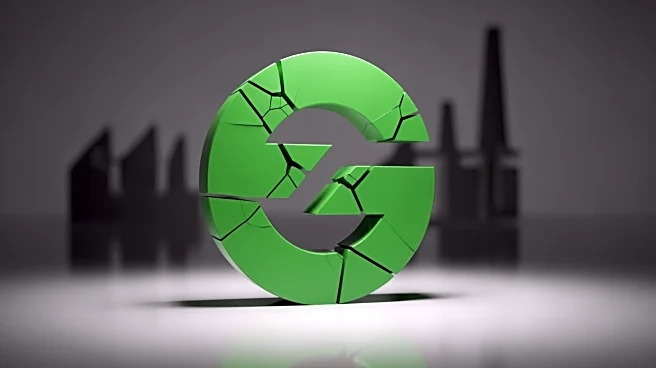What's Happening?
A Paris court has ruled against TotalEnergies, finding the company guilty of misleading consumers about its role in the energy transition. The court determined that TotalEnergies' claims of being a 'major
player in the energy transition' and on a 'path to net zero by 2050' were deceptive under French consumer law. This ruling marks the first time a fossil fuel major has been held legally accountable in France for greenwashing. The case was brought by environmental groups Greenpeace France, Friends of the Earth, and Notre Affaire à Tous, who argued that TotalEnergies' communications created a false impression of its commitment to the Paris Agreement. The court ordered the company to stop using misleading phrases, publish the ruling on its website for 180 days, and pay fines to the plaintiffs.
Why It's Important?
The ruling against TotalEnergies is significant as it challenges the narrative that energy companies can claim to be transitioning to greener practices while continuing to invest heavily in fossil fuels. This decision could set a precedent for other energy companies, prompting them to reassess their marketing strategies and public statements. The case highlights the growing legal risks associated with greenwashing, as courts begin to scrutinize the alignment between companies' public claims and their actual business practices. This could lead to increased accountability and transparency in the energy sector, influencing investor perceptions and potentially affecting the financial stability of companies that fail to align their operations with their stated environmental goals.
What's Next?
TotalEnergies is expected to appeal the decision, potentially arguing that the ruling misapplies consumer law or that its statements were aspirational. However, the requirement to publish the ruling on its website ensures continued visibility of the case. Other energy companies are likely to take note of this ruling and may review their marketing language and environmental, social, and governance (ESG) reports to avoid similar legal challenges. The case may also inspire similar legal actions in other jurisdictions, as consumer protection laws are increasingly used to hold companies accountable for misleading environmental claims.
Beyond the Headlines
The ruling exposes a deeper tension between what energy companies say and what they do, as many have adopted long-term carbon neutrality goals without corresponding short-term cuts in fossil investment. This mismatch is not limited to France, as companies like BP, Shell, and Equinor have also adjusted their energy transition plans. The case underscores the importance of aligning marketing claims with actual business practices to maintain credibility and avoid legal and reputational risks.








